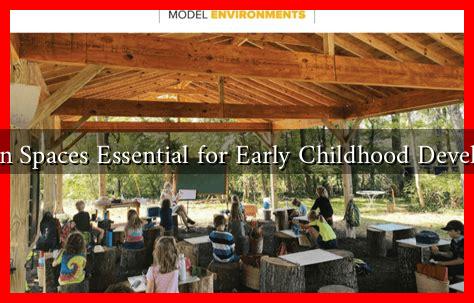-
Table of Contents
Are Open Spaces Essential for Early Childhood Development?
In an increasingly urbanized world, the importance of open spaces for early childhood development cannot be overstated. These areas, which include parks, playgrounds, and natural environments, play a crucial role in the physical, emotional, and cognitive growth of young children. This article explores the significance of open spaces in early childhood development, supported by research, case studies, and statistics.
The Role of Open Spaces in Physical Development
Open spaces provide children with the opportunity to engage in physical activities that are vital for their growth. According to the Centers for Disease Control and Prevention (CDC), regular physical activity in early childhood helps to build strong bones and muscles, control weight, and reduce the risk of chronic diseases later in life.
- Encouragement of Active Play: Open spaces allow children to run, jump, climb, and explore, which are essential activities for developing motor skills.
- Social Interaction: These environments foster social skills as children engage in cooperative play, learning to share and negotiate with peers.
- Connection to Nature: Access to natural environments has been linked to improved physical health and well-being, as children are more likely to engage in outdoor play.
Cognitive Development Through Exploration
Open spaces serve as a canvas for children’s imaginations. When children are allowed to explore their surroundings, they engage in problem-solving and critical thinking. A study published in the journal Child Development found that children who have access to natural environments exhibit higher levels of creativity and cognitive flexibility.
- Stimulating Curiosity: Open spaces encourage children to ask questions and seek answers, fostering a love for learning.
- Hands-On Learning: Nature-based play allows children to learn about their environment through direct interaction, enhancing their understanding of scientific concepts.
- Risk Assessment: Exploring open spaces helps children learn to assess risks and make decisions, which is crucial for cognitive development.
Emotional and Social Benefits
The emotional and social benefits of open spaces are equally significant. Research indicates that children who spend time in natural settings exhibit lower levels of stress and anxiety. A study by the University of Illinois found that children with access to green spaces showed improved attention spans and reduced symptoms of Attention Deficit Hyperactivity Disorder (ADHD).
- Emotional Regulation: Nature provides a calming effect, helping children learn to manage their emotions effectively.
- Building Relationships: Open spaces facilitate social interactions, allowing children to form friendships and develop social skills.
- Sense of Belonging: Regular access to community parks and playgrounds fosters a sense of belonging and community among children and their families.
Case Studies and Real-World Examples
Several cities around the world have recognized the importance of open spaces for early childhood development and have implemented programs to enhance access to these areas.
- New York City: The NYC Department of Parks and Recreation has developed numerous playgrounds that incorporate natural elements, promoting both physical activity and imaginative play.
- Singapore: The city-state has integrated nature into urban planning, creating parks that are accessible to families, thereby enhancing children’s developmental opportunities.
- Scandinavian Countries: Countries like Sweden and Norway prioritize outdoor play in early childhood education, with children spending significant time in nature, leading to better overall development outcomes.
Conclusion: The Indispensable Value of Open Spaces
In conclusion, open spaces are not merely recreational areas; they are essential for the holistic development of young children. From fostering physical health to enhancing cognitive skills and emotional well-being, the benefits of open spaces are profound and far-reaching. As urbanization continues to encroach upon natural environments, it is crucial for policymakers, educators, and communities to advocate for and invest in accessible open spaces for children. By doing so, we can ensure that future generations have the opportunity to thrive in a nurturing and stimulating environment.
For more information on the importance of outdoor play and open spaces, visit Nature Play.

